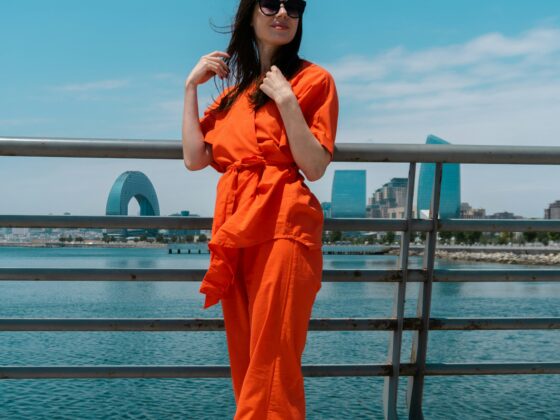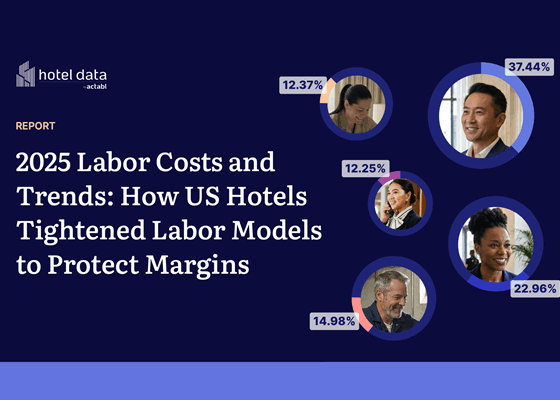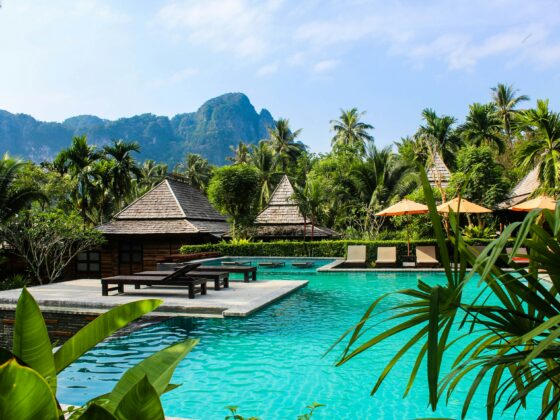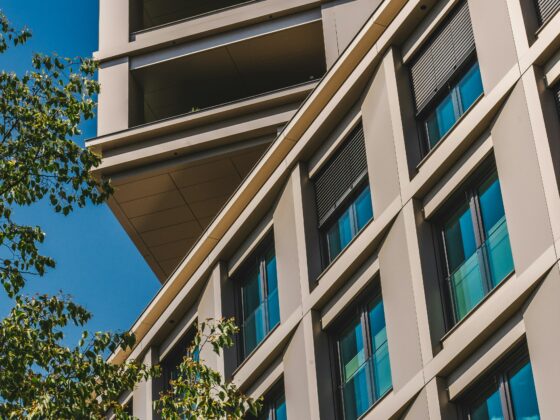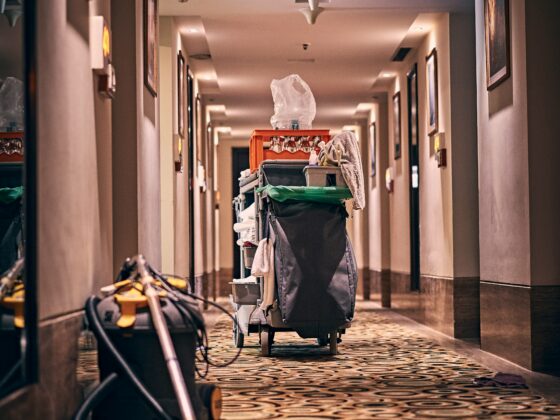Now a year-round destination
Michel arrived in Dubai some 15 years ago, and in that decade and a half the biggest, most transformative change he’s seen in the hospitality business has been the eradication of the summer ‘dead season’.
“It was always said that summer was dead in Dubai and that was that. But as we added more and more year-round attractions, and different types of hotels, we started to see tourists arriving in summer from markets where the peak winter rates were generally unaffordable. So today we have flat occupancy of around 80% throughout the year. The fluctuation comes in the average rate.”
While there’s no doubt that Dubai’s outside temperatures take some getting used to – for your fair-skinned northern European correspondent at least – even here the authorities are not admitting defeat to Mother Nature. One noteworthy project in this area is THE LOOP, a new 93km ‘sustainable urban highway’ that will enable walking and cycling in a climate controlled environment all year round.

Even at a more day-to-day level, initiatives like cooling swimming pool water for a refreshing evening swim, and of course the ubiquitous air conditioning, mean that restaurants and activities can be open throughout the hot summer months.
50 shades of growth
For Marriott International, a relentless growth in its regional footprint has provided the headlines, but within this story are a host of threads and nuances.
“There has been – and remains – a major focus on luxury in these markets,” Michel explains. “But of course not everyone can afford luxury; and what we’ve also seen post-Covid is a desire to get away and spend on experiences, with a good hotel stay but perhaps not at the true luxury end of the spectrum – what we at Marriott would call select service hotels.
“There’s also been a surge in demand for longer stays in branded apartments and residences. In particular, we are seeing large numbers of people from Europe and the US who, for whatever reasons, are coming to stay here for an extended period. So we are growing our long stay offer through brands like Element and Marriott Executive Apartments.”

The UAE has additionally been at the forefront of the crossover between ‘mainstream’ luxury brands and hospitality. Michel reveals that the ultra-luxe Bulgari Resort & Residences, which opened in Dubai in 2017, became so successful that it was generating revenues comparable to full regions in Europe. And this from a property with ‘just’ 100 rooms and suites plus 20 villas.
Last but not least, the lifestyle brands in the company’s portfolio are also making strides into the UAE. The first Moxy Hotel in the region is due to open shortly in Dubai’s Al Barsha neighborhood and, as a longtime fan of the brand, this is a development that Michel is especially excited about.
To maintain a pipeline appropriate for this demand pressure, operators like Marriott are now opting to ‘flip’ existing buildings into hotels or to acquire existing hotel properties and converting them to a Marriott concept suitable for the location. Michel says that with typical lead times on ‘green field’ developments in Dubai of anything up to six years, a building flip can slash that to between six months and a year.
Blessed with talent
With so much growth in the hospitality sector – and given its absolutely critical role in fulfilling the UAE’s tourism ambitions – what is Michel’s current take on the ‘talent question’ for major hotel companies like Marriott?
“First and foremost, we have to recognize that as hospitality operators we are super-blessed to be in this part of the world, with such a vast talent pool to draw from,” he says. “When I go back to Europe and speak to colleagues in France, Switzerland, or the UK, they tell me it’s a real struggle to recruit talent, especially for the operational roles that are at the heart of the hotel.

“Here we’ve always enjoyed a flow of talent from Asia, and that’s been great because the sense of hospitality these individuals come with is second to none. Nowadays we are also seeing a lot of people arriving here from Europe, who are attracted by the lower tax environment that means they can have a much better quality of life on an equivalent salary to what they were earning back home.
“And now, all of a sudden, talents from Latin America have discovered us! I lived in Spain for 10 years, so I can converse in Spanish, and when I talk to these individuals I find they are coming from some quite remote regions. With what they earn here in the UAE they can save up to buy an apartment back home, to help their families, or just to pay off their student loans.
“What all this means is that we never, ever have a shortage of potential recruits. In fact, when we open a role we usually have to close it after two or three days because we’ve already received thousands of CVs from all over the world!”
That said, the key word in hospitality at the moment is ‘authenticity’ and, with this as the goal, Michel adds that Marriott is also focusing its talent search closer to home, with a view to bringing more Emiratis and others from GCC (Gulf Cooperation Council) countries into the hotel business.
“More and more, we are starting to see lobby ambassadors, hosts and hostesses who are Emiratis; and that’s just fantastic because they have so much to tell the guests about the history and traditions of this region. Even down to wearing the local dress – this adds a layer of authenticity, same as when you visit a hotel in Japan and you’re speaking to someone in a kimono.”
The quest for soft skills
On the topic of the human-to-human connections that hospitality is all about, does Michel think that the soft skills – empathy, communication, intercultural fluency – which power these connections can be taught?
“It’s a great question and I would say it is our biggest challenge, because with all respect to technologies like Chat GPT ours is a business built on human interaction. Hotels also never close, right? Hospitality is not a nine-to-five job and we all know this.
“Our challenge is that we are dealing with people. They are not computers or microwaves; they are people with emotions and they all come with their own problems, their own sources of happiness, their own successes, everything. So for us, before taking care of our guests, we have to take care of our people.

“In terms of developing soft skills, we do a lot of training based around role playing, where we take them through different interactions based on different guest profiles. It’s about making those emotional connections: how did you make the guest feel? How did you make that facial connection? How did you go far beyond what the guest was asking?”
This approach also plays out in recruiting, where Michel says that the CV has become secondary as the company looks to hire on attitude rather than purely on experience.
“I want to spend an hour with that person, to see if he or she has impacted me, has moved me, based on a question I’ve asked or the story they want to tell me. Experience you can teach, but first it’s vital for an individual to have that attitude and that sense of service embedded in them.”
“Experience you can teach, but first it’s vital for an individual to have that attitude and that sense of service embedded in them”
As a final question, I wanted to get Michel’s thoughts on probably the number one story in the tourism industry today: Saudi Arabia. I wondered if he saw the Kingdom as a competitive threat to the UAE tourism ecosystem?
“From my personal perspective I see it as overwhelmingly positive,” he stresses. “When you look at this part of the world – and I don’t mean just Dubai or Abu Dhabi, but the entire GCC region – what is happening is simply sensational. And it’s a race to the top, not the bottom. When the UAE announces something amazing, the Saudis want to do it bigger and better. Same for Qatar. And we’re all benefiting from that.
“When you remember it was only in 2019 that Saudi Arabia introduced a tourist visa… what they’ve already achieved in just a few years is unbelievable; it’s mind blowing! Of course, there will competition for visitors between countries, but for Marriott it’s a huge opportunity. And just to emphasize my point, we currently have 40 hotels in Saudi Arabia, and there are 50 more under construction – so we’re going to more than double our footprint when that’s all delivered.”
Photo credit
Main image: ImageGap/Getty
Dubai Airport: Gadi Sharbatov/Getty

